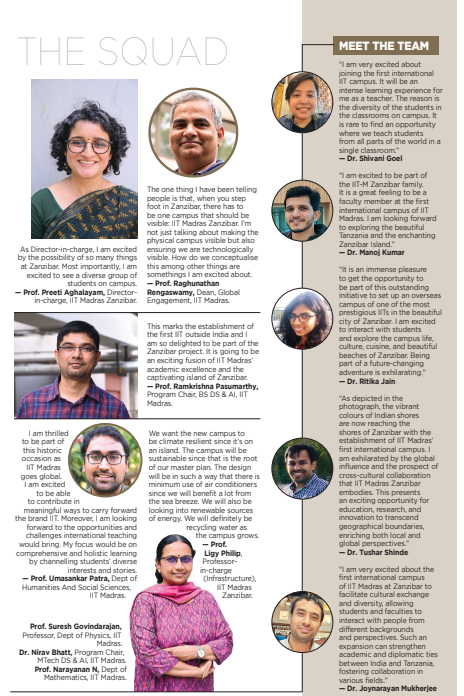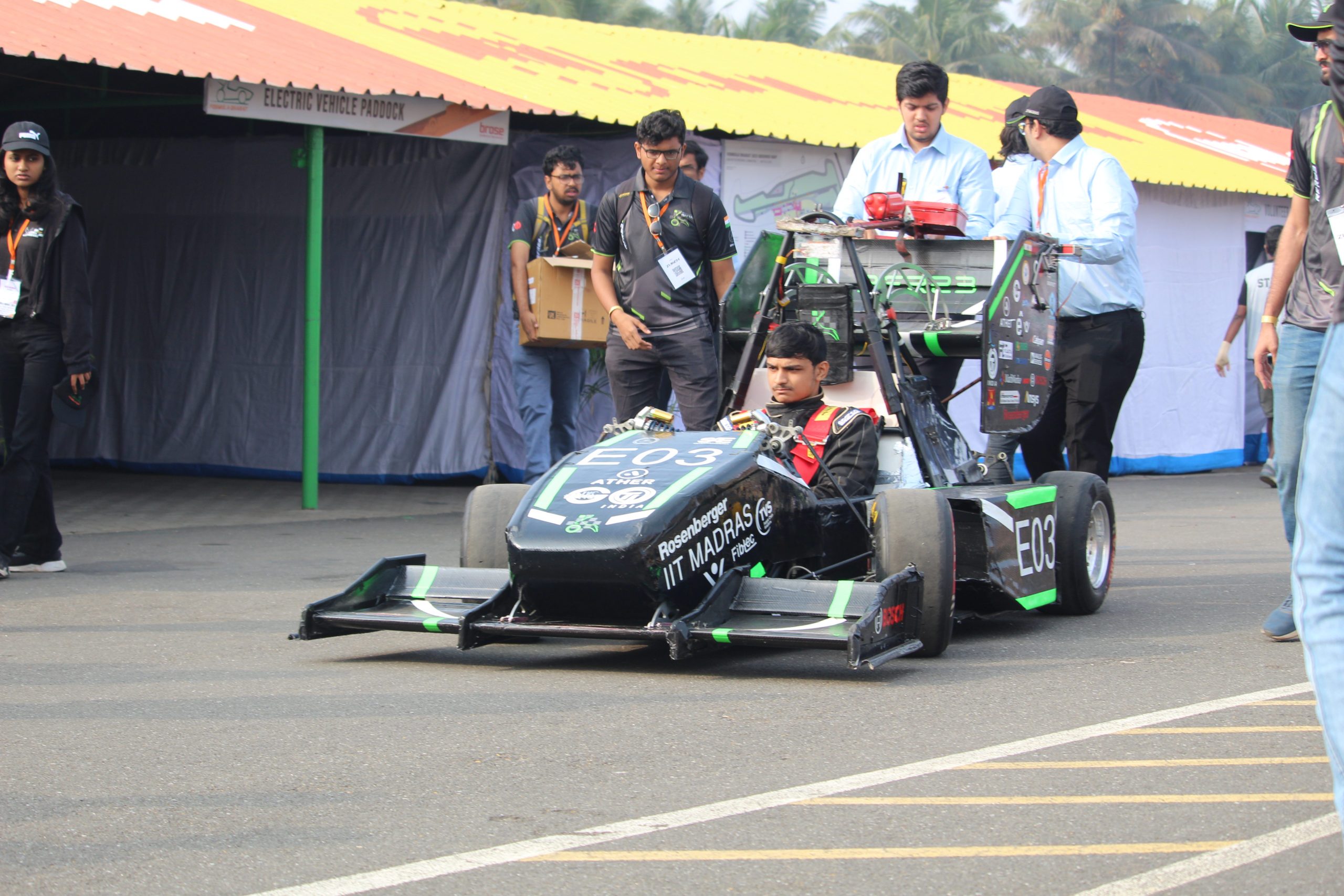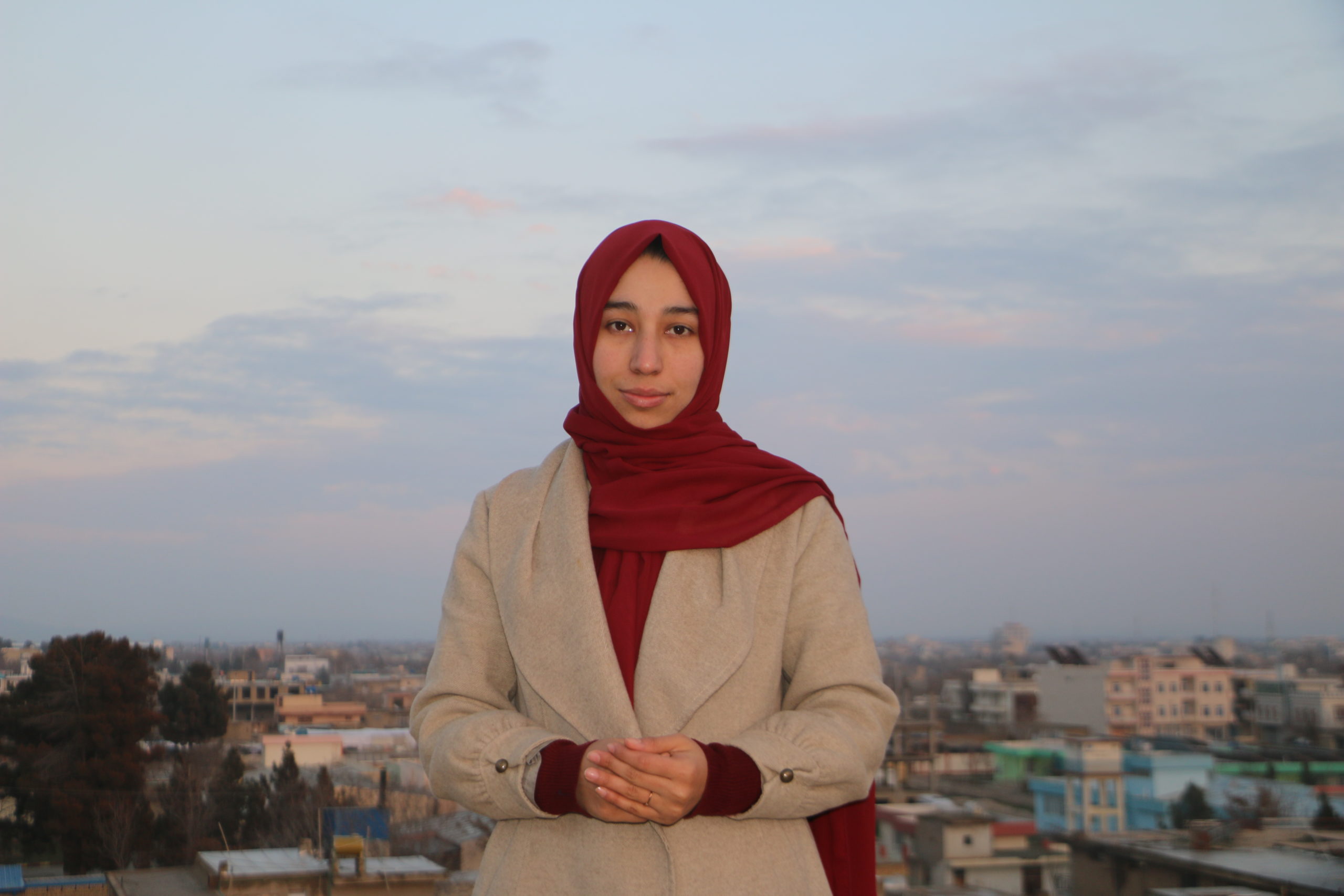Six decades after its establishment, the Indian Institute of Technology Madras now has a campus coming up in Zanzibar, Tanzania, reflecting the longstanding friendship between India and Tanzania. The IIT-M Zanzibar is the first significant step towards the expansion of IITs beyond Indian borders, fostering an educational collaboration. Ahead of its launch, we meet the core team of the Zanzibar project to discuss the vision of the institution, its programs, and what the future holds
Srivatsan S
On July 6, 2023, barely a few weeks before marking the momentous occasion of the 60th Convocation Day, the Indian Institute of Technology Madras was etched in the annals
of history for an entirely different reason. For, nearly six decades later, the revered institution, which has consistently been the top ranked IIT in the country, became the first among IITs to sign a Memorandum of Understanding (MoU) between the Ministry of Education (MOE), India, IIT Madras, and Ministry of Education and Vocational Training, Zanzibar (MoEVT).
The Ministry of External Affairs (MEA) announced that Tanzania’s Zanzibar will be home to the first-ever Indian Institute of Technology (IIT) campus outside of India. Sharing hisexcitement on X (formerly Twitter), India’s External Affairs Minister Dr. S Jaishankar wrote, “Witnessed the signing of the agreement on setting up of IIT Madras Zanzibar campus. Appreciate President Dr Hussein Ali Mwinyi gracing the occasion, as also the presence of his Ministers. This historic step reflects India’s commitment to the global South.”
The agreement was signed amid distinguished dignitaries from both India and Tanzania including External Affairs Minister S Jaishankar and Zanzibar’s President Hussein Ali Mwinyi. Quietly seated among them were two IIT-M alumni who were instrumental in setting the balls rolling for the Zanzibar project.
One was Raghunathan Rengaswamy, Dean, Office of Global Engagement, IIT-M. The other was Preeti Aghalayam, who, on her part, made history by becoming the first woman Director of an IIT campus. It was a moment that could have been a flash. But Raghunathan clearly remembers the headspace he was in, when he held the MoU in front of Zanzibar’s President and posed for the picture. “It was a historic moment for sure. But the other thing that was running in my mind was the kind of responsibility the team has,” says
Raghunathan, seated in his office at the Sudha and Shankar Innovation Hub, IIT Madras.
Raghunathan
Rengaswamy
was
appointed
as Dean
of
Global
Engagement,
which
facilitates
every
international
collaboration-relation
within
the
institution,
ever
since it
was
established
in
February
2020.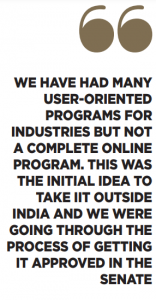
While the conversation around an IIT Madras campus outside India came much later, says Raghunathan, the idea – of an IIT outside India – has been floating around for quite some time.
One way was to go completely online. For instance, when someone takes an online M.Tech course from anywhere in the world and has enough credits, they get a degree from IIT Madras. But it required the approval of the senate. “We have had many user-oriented programs for industries but not a complete online program. This was the initial idea to take IIT outside India and we were going through the process of getting it approved in the senate,” says Raghu.
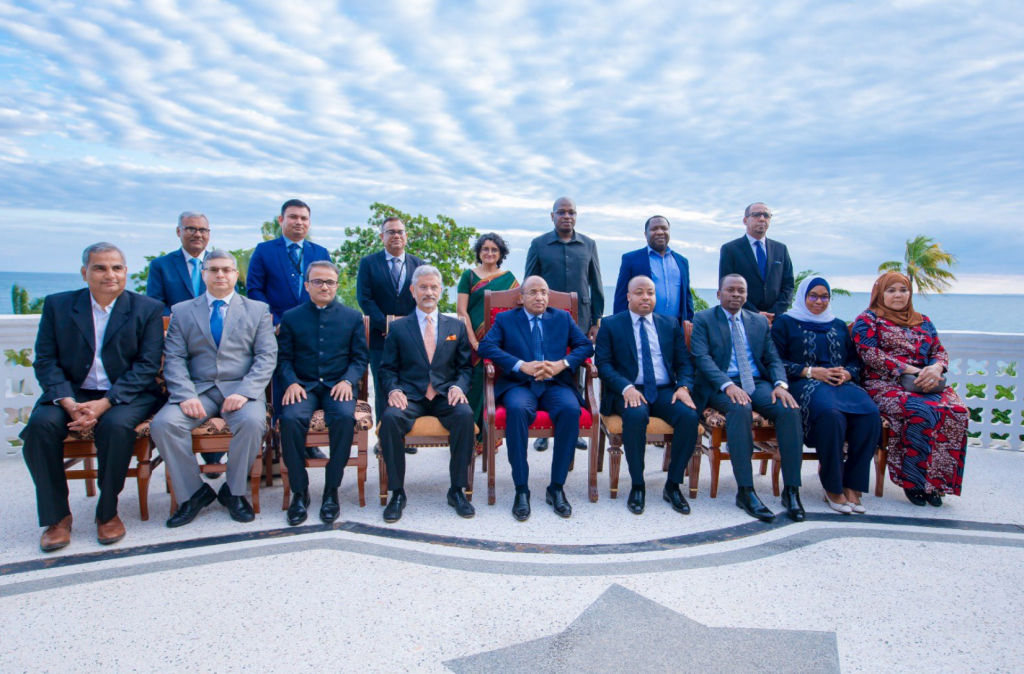
Everything was set. The Tata Consultancy Services (TCS) was reportedly interested in facilitating the technical process for an online only program. “I don’t remember his name but one of them [from TCS] talked about the difficulty of remote programs; the fact that students will be attending classes from random places. He suggested that we should tie-up with a college and run our program through them, so that we have students coming to the class even if remotely.” This, apparently, was a working model for several international universities.
Raghunathan saw the potential. Unlike a satellite or offshore campus, the idea was to establish a partnership with universities that will solicit applications for IIT degrees. “In doing so, we get students from their campuses and at the same time, we wouldn’t dilute the IIT Madras quality of education,” says Raghu.
After several brainstorming sessions and multiple site visits, Raghu and Preeti came close to executing this model in Sri Lanka, while in Nepal, they were trying to work out the other model, which was to set up an offshore campus. Both proposals fell through. They were back to square one. Then came hope disguised in the form of a mail from the MoEVT, Zanzibar, Tanzania to set up an offshore campus.
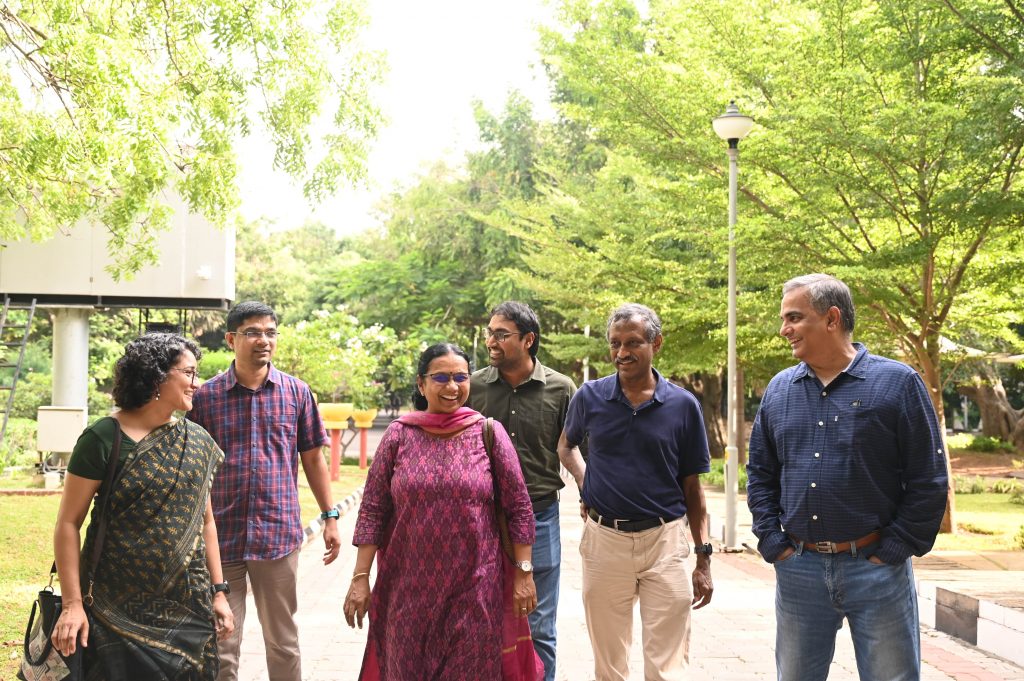
‘An opportunity and a challenge’
For IIT Madras’ Director V Kamakoti, it was a question of need more than anything else. “There should be a genuine need for IIT-M to be fully involved for the institution’s growth. But the need alone isn’t sufficient without the government’s support. And then without a good higher education school system in the country, it would be meaningless. Otherwise, we would become a training institution rather than a School of Excellence,” says Prof. Kamakoti, adding that Tanzania-Zanzibar met these three parameters.
The Indian National Education Policy (NEP) 2020 recommends that “high performing Indian universities will be encouraged to set up campuses in other countries”. It aims to find ways for “transformational reforms in school and higher education system to make India a ‘Vishwa Guru’.”
During NEP 2020, Kamakoti made a presentation to the Minister of Education Dharmendra Pradhan, who, in fact, suggested Tanzania. “Our wonderful Minister Pradhan-ji, given his knowledge in the petroleum industry, has a good understanding about Africa. When he mentioned Tanzania, I didn’t know where it was,” laughs Kamakoti.
Director Kamakoti was unsure whether the Government of Tanzania-Zanzibar would show as much interest. But the Government took proactive steps and within a span of weeks, the entire contingent from Tanzania arrived at IIT-M. “From then on, things moved at an astronomical pace with our energetic Binaya Pradhan-ji [High Commissioner of India, Tanzania] involved,” he adds.
It still wasn’t clear whether it was going to be an International Institute of Technology, Tanzania, hand-held by IIT Madras, or an entire offshore campus. This was when Raghunathan Rengaswamy led the delegation to Tanzania-Zanzibar along with Prof. Preeti Aghalayam, Prof. Ligy Philip, Prof. A Mani, and Director of IIT Tirupati, Prof. KN Satyanarayana.
When the team arrived in Zanzibar, all their doubts and uncertainty were addressed. The Minister of Education, Science, and Technology, Tanzania, Adolf Mkenda, made it quite clear that they want an IIT Madras Zanzibar institution and not a campus hand-held by IIT-M.
Raghunathan says the delegation was given the freedom to do “whatever we wanted”. “But at the same time, we didn’t want to promise anything that the Government of India would later say ‘no’ to. Having said that, there was support all the time [from both Governments] and we could always circle back.”
For Preeti Aghalayam, Director-in-charge, IIT Madras Zanzibar, it was about finding an ideological match. She throws caution that the new campus wouldn’t mimic IIT-M in any way. “There are foundational strengths of IIT-M we will retain,” she says, adding, “We want to encourage homegrown talent and be sensitive towards people — whether it is faculty, students or parents.”
She sees the Zanzibar campus “as an opportunity and a challenge” to protect the foundational principles of IIT-M.
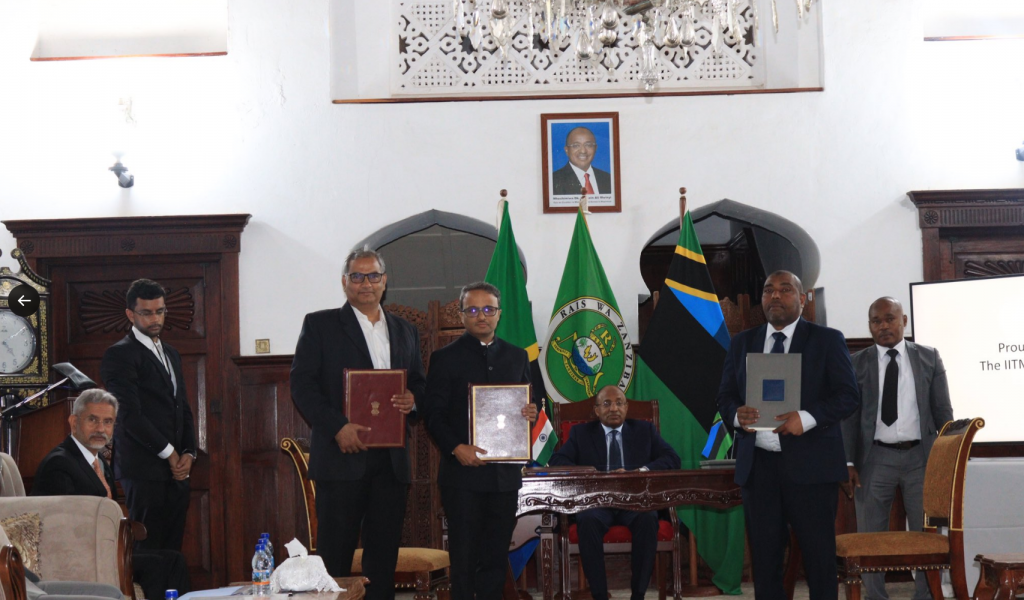
What the future holds
The IIT Madras Zanzibar offers two programs: a four-year Bachelor of Science in Data Science and AI, and a two-year Master of Technology in Data Science and AI.
Why Data Science? “We had a push from MoEVT Zanzibar for a computer literacy or computer heavy program. Of course IIT Madras has a very strong Data Science program and globally many universities are moving towards Data Science and AI,” says Raghu, adding that the programs were mutually decided.
The new campus has an Advisory Council chaired by Raghunathan Rengaswamy, while the rest include distinguished names: Prof. Robin Mason, Pro-Vice Chancellor (International), University of Birmingham, Prof. Leonard Wantchekon, Founder and President, African School of Economics, Professor of Politics and International Affairs, Princeton University, Dr. Mridula Nair, Research Fellow, Distinguished Inventor, Distinguished Alumna of IIT-M, Eastman Kodak Company, USA, and Dr. Pramath Raj Sinha, Founder and Chairman, Harappa Education.
There is a Program Advisory Committee comprising Prof. Sharat Chandran, IIT Bombay, Prof. C Pandurangan, IISc Bangalore and Prof. Mark Lee, University of Birmingham.
“We picked international people that we know will contribute or have done similar things in the past. We wrote to them and almost everyone wrote back immediately with a ‘yes’. The notion of a program advisory committee is to take care of the execution part, while the advisory council will look at the institute from a broader, global context, because we want this institute to be internationally recognised,” he adds.
One of the things we keep hearing about IIT-M is campus placements. Are there any measures being taken for campus placements at the Zanzibar campus?Raghunathan has no second thoughts about placements, given that the first batch of students to get their degrees will be in 2025, while the BS students will graduate in 2027.
“What we are trying to do with our teaching is to integrate a project with a company, followed by a longer project. That is how we are going to look at placements. Plus, Zanzibar and African regions are growing. Those companies need manpower and what better than local talent?”
For a relatively new and younger cousin in IIT-M Zanzibar, KN Satyanarayana foresees the key challenge — at least for the next few years — to be the campus culture.
“It is important to set the culture right for the campus and that is not happening anytime soon. Setting up a culture takes a long time,” he says, adding that, because it is a new campus and there is a lot of work to be done that might get overwhelming at times, it is always safe to determine the larger goal of the institution for the next 10 years.
As far
as the
future
is
concerned,
Raghunathan
has the
last
word.
“It’s
going to
be a
trade-off,”
he says.
The
challenges
at the
Zanzibar
campus
seem to
arise
out of a
chicken
and egg
problem:
without
generous
funds
for
tuition,
it is
difficult
to
generate
reputation,
and
without
a great
reputation,
it is
difficult
to
generate
funds.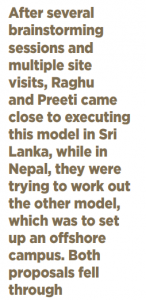
“IIT Madras has a great reputation, for instance, but that is not going to transfer lock, stock and barrel to the Zanzibar campus,” says Raghu.
Naturally, the campus has to develop a reputation by itself through merit, which would take a couple of years easily. So, how does one accelerate to achieve it? “I think we have to be technologically visible in Zanzibar and Tanzania,” he says, “As an institute, we should not just be educating students but bring about a technological change in the country. If that happens, everything will fall into place.”
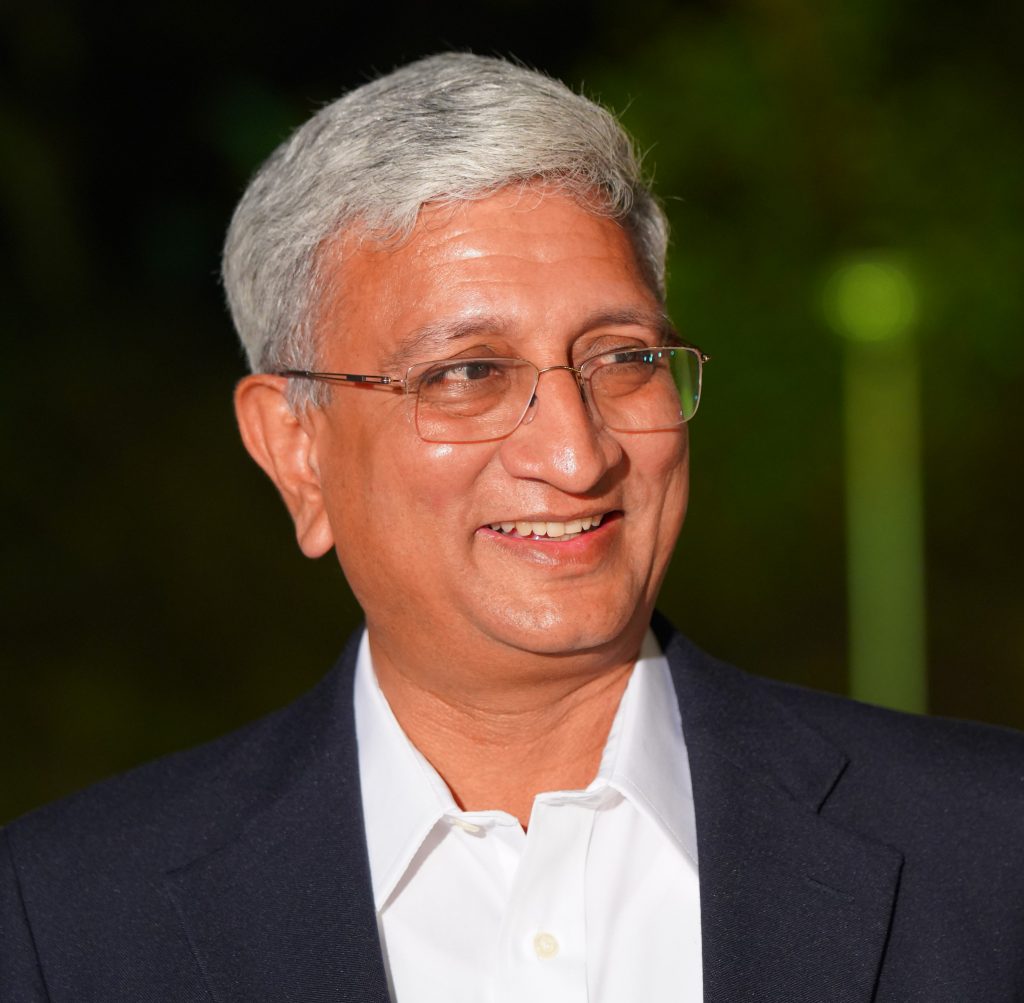
Q&A
When you got a call from IIT Madras about a possible international campus in Zanzibar, how did you react?
Basically, they wanted my guidance because we established the IIT Tirupati campus. I was a little sceptical initially because I wasn’t sure whether IIT-M is going to be fully involved [like in the case of IIT Madras, where Germany played a major role in setting up the institution in the ‘50s and 60s] or going to assist them. But later when I visited Zanzibar along with Raghu and Preeti, and the kind of warm reception we got from the Ministry of Education and Vocational Training, I was convinced.
What were your initial impressions of Zanzibar from your visit? Did you have any suggestions from your side?
Zanzibar, I feel, is a strategic location for us to set up the campus. With tourism and a blue economy thriving there, Zanzibar is a central location in Tanzania. One of the briefs I gave them was, if you are going to set up a campus like IIT Madras, you need at least 500 acres of land. Or at least 300-400 acres. But eventually, I think they are getting more than 200 acres for the permanent campus.
As the Director of IIT Tirupati, what are the ways in which you can work with the Zanzibar campus?
Having worked at IIT Madras as a faculty, I have established some strong connections with the mother institution and Zanzibar campus too. I think research is one area where IIT Tirupati can collaborate and work with them in the future.
Prof. KN Satyanarayana
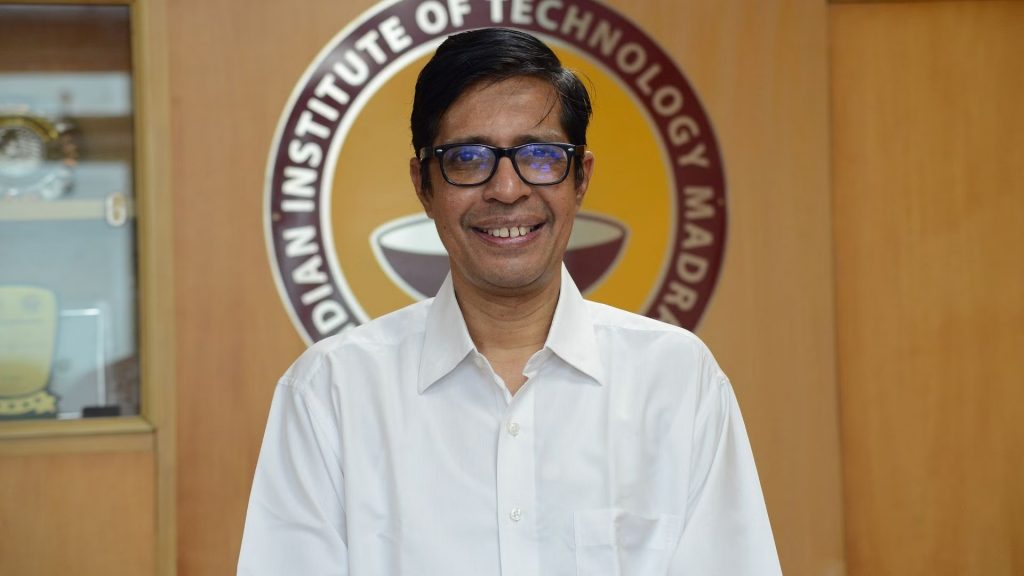
From the horse’s mouth
What was the first thought that crossed your mind when you heard about this idea from the Ministry of Education to set up a campus outside India?
First and foremost, how did IIT Madras come up? Back then, there was a need to establish a highly technical institution in the country. Germany offered us the help so they came to India and set up IIT-M. In fact, we had a lot of German professors as late as the late ‘80s who have contributed to the growth of this particular institution.
Today, some of the best practices we see at IIT-M have the German legacy, which also reflects how closely we work with them even today. We have visitors from Germany almost every week; it is a long standing relationship we have with them. These thoughts came up the moment we talked about Vishwa Guru during the National Education Policy [NEP] 2020. The Indo-German relationship that we enjoy at IIT-M, we wanted to have that with some other country.
Recently we had our 60th convocation and the time has come for us. This was my initial thought.
As the Director of IIT Madras, what do you think would be the ideal short and long term goals for the Zanzibar campus?
Short term for me is five years. I want to get at least three undergraduate and two postgraduate or two undergraduate and three postgraduate programs that would be of relevance to East Africa. Like our next next generation IITs, I would like to see if we can have five programs running in the institution. This is one.
A lot of Tanzanians are coming to IIT-M for their PhDs. So we want to generate local manpower who can become great teachers. We have been recruiting faculty and I didn’t expect five excellent resumes to come in short notice. A lot of our own faculty members are also going to contribute so the institute, as a whole, will be excellent.
My gut feeling is that we should start admitting 250 students every year. So that will be 125 in UG and 125 in PG. We should at least have a thousand students for some 10 years and see how everything turns out. We are now looking at interdisciplinary courses, not conventional engineering programs. That is going to make a major difference in Africa.
The other thing is, within the 215-acre, we want to start a Research Park. Imagine a G20 at the Research Park in Zanzibar. We would also like to expand more on Humanities and Management programs because Indo-african cultural relationships can be defined. That is very important. This is not just an education institution but also a meeting of two different cultures. We have a lot of commonalities and we have differences. While we should address the differences, we should cash in on the commonality.
The other thing is, like how we have a partnership with Purdue University for dualdegree programs, I want something like this in Zanzibar. These are my visions for the new campus.
One of the things we keep hearing about public-funded institutions such as IITs is that the net return is way less compared to the rate of expenditure. If implemented successfully, do you think international campuses will add another layer of revenue to the IITs?
No, I am not looking at revenue at this point. As Indians, we have a very big culture of sharing knowledge. So this is not a commercial proposal at all. At this point of time, whatever money is generated will be pumped back into that campus for its growth.
Any word of advice for Preeti Aghalayam, Director in-charge of the Zanzibar campus?
Preeti has done a great job. I think she is now in a state where she can advise me on how to go about this [laughs]. She has been with our Office of Global Engagement for quite some time and has understood Zanzibar very quickly. Preeti has a complete grip over the situation there. I am very happy that she is managing it so much on my behalf.
We are only a month away from the official launch. Excited?
In the history of IIT Madras, going over six decades back, we are the first to set up an international campus and the first class is going to happen. That is the most exciting thing for me. And that is also a message we are giving out to others. I think we are setting a good example with Zanzibar. It is going to be a learning lesson for us too. And from these lessons, we can help other IITs in the future.
